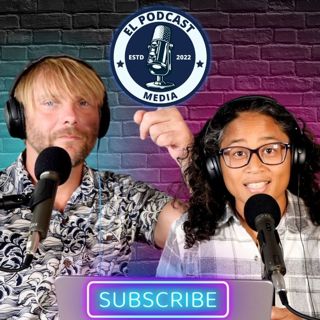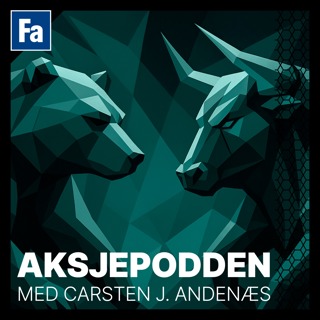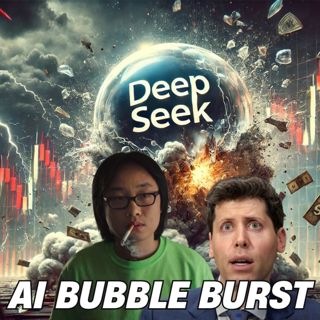
E116: DeepSeek, Tech Hype & the Future of Work - w/ Erik J. Larson
Computer Scientist, Erik J. Larson returns to discuss the global shakeup in AI sparked by DeepSeek and Alibaba’s Qwen 2.5 Max. We unpack how these models challenge Silicon Valley’s dominance, what makes them technically significant, and the broader implications for geopolitics, open-source innovation, and the future of AGI. Also discussed: NVIDIA’s record valuation drop, open-source trends, and whether the U.S. is losing its lead in artificial intelligence.Topics Covered:DeepSeek’s emergence and performance edgeQwen 2.5 Max vs. ChatGPT📺Why Silicon Valley may be falling behindGeopolitical stakes in the AI raceOpen-source vs. proprietary modelsDeep learning limits and the hype cycle Watch full episode on YouTube➡️https://youtu.be/xiLZhUiEsyc 🎙 The Pod is hosted by Jesse Wright💬 For guest suggestions, questions, or media inquiries, reach out at https://elpodcast.media/📬 Never miss an episode – subscribe and follow wherever you get your podcasts.⭐️ If you enjoyed this episode, please rate and review the show. It helps others find us. Thanks for listening!
2 Feb 1h 48min
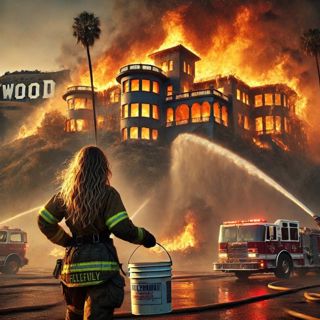
E115: The Science Behind LA Wildfires: Fire Expert Jon Keeley
Dr. Jon Keeley, senior scientist at the U.S. Geological Survey and professor at UCLA, joins us to break down the record-breaking 2025 California wildfires. He explains how drought, wind, power lines, and population growth created a perfect storm—and why prevention, not firefighting, may be our best defense.Topics Covered:Why the 2025 wildfires were so destructiveSanta Ana winds and drought patternsHuman ignition sources: power lines & arsonHow home design and zoning can reduce riskMyths about fire ecology in Southern CaliforniaLessons for the future: prevention over blameGuest Info: Dr. Jon Keeley is one of the world’s leading fire ecologists, with over 40 years of research on wildfires, climate, and land use in the American West.📺Watch the full episode on YouTube➡️https://youtu.be/07R5OphHG6E 🎙 The Pod is hosted by Jesse Wright💬 For guest suggestions, questions, or media inquiries, reach out at https://elpodcast.media/📬 Never miss an episode – subscribe and follow wherever you get your podcasts.⭐️ If you enjoyed this episode, please rate and review the show. It helps others find us. Thanks for listening!
25 Jan 55min

E114: The California Fires: An Expert's Insight w/ Dr. Mark Schwartz
In this episode, environmental scientist Dr. Mark Schwartz joins us to unpack the devastating California wildfires, which have already destroyed over 12,000 structures and displaced more than 100,000 residents. Schwartz explains why these fires were predictable, how the state’s geography and housing patterns fuel the crisis, and why most proposed solutions—from controlled burns to home hardening—face major political and regulatory obstacles.-Guest Info: Dr. Mark Schwartz, Professor Emeritus, UC DavisWe discuss:The difference between Northern and Southern California fire riskWhy LA’s chaparral makes fires fast and unmanageableThe real economics behind fire suppression vs. preventionHow outdated zoning and insurance rules keep people in harm’s wayWhy individual and community action may be more effective than top-down policyDr. Schwartz also offers hopeful insights into grassroots strategies that could finally shift the paradigm—and why now is the narrow window to act. 📺Watch the full podcast on YouTube➡️https://youtu.be/KvgDcJre_ww 🎙 The Pod is hosted by Jesse Wright💬 For guest suggestions, questions, or media inquiries, reach out at https://elpodcast.media/📬 Never miss an episode – subscribe and follow wherever you get your podcasts.⭐️ If you enjoyed this episode, please rate and review the show. It helps others find us. Thanks for listening!
23 Jan 55min

E113: How AI Will Shape Our Future & How to Stay Ahead - w/ Pedro Uria-Recio
Pedro Uria-Recio joins us to explore the transformative power of AI—its impact on jobs, education, geopolitics, and society at large. From job automation and universal basic income to AI’s role in medicine, war, religion, and entrepreneurship, this wide-ranging conversation tackles the hopes, fears, and opportunities of our AI-driven future.We also dive into quantum computing, the US-China AI rivalry, and the critical need for smart regulation. Don’t miss Pedro’s practical insights and his new book on staying ahead in the age of intelligent machines.🔗 Book: How AI Will Shape Our Future → AmazonChapters:00:00 AI's Impact on Society05:27 AI’s Dual Impact on Employment12:24 Skills for the Future Workforce16:51 UBI & Education’s Role33:13 US vs China: The AI Cold War42:21 AI in Medicine & Industry46:12 AI & Religion49:35 Bitcoin & Quantum Computing54:15 AI and UBI Impacts59:59 Entrepreneurial Opportunities01:04:10 Final Thoughts & Book Info👉 Like and subscribe to El Podcast! 🎙 The Pod is hosted by Jesse Wright💬 For guest suggestions, questions, or media inquiries, reach out at https://elpodcast.media/📬 Never miss an episode – subscribe and follow wherever you get your podcasts.⭐️ If you enjoyed this episode, please rate and review the show. It helps others find us. Thanks for listening!
1 Jan 1h 9min
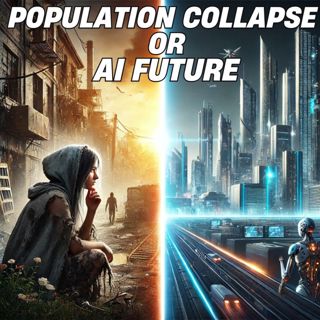
E112: Economic Implications of Shrinking Population & Aging Societies - w/ Dustin Whitney
Dustin Whitney joins us to explore the economic, social, and policy implications of population decline. We discuss aging societies, the myth of overpopulation, and what a shrinking GDP means for business, government, and everyday life.Guest Info: Dustin Whitney – Business executive, entrepreneur, and author of Demographic Deception: Exposing the Overpopulation Myth and Building a Resilient FutureTopics Covered:Why GDP models break down in a low-population futureThe labor force crisis: fewer workers, more retireesDependency ratios, social security, and government spendingThe illusion of AI as a silver bulletHousing market shifts due to boomer wealth transferThe myth of endless immigration as a solutionBusiness opportunities in a declining demographic environmentTrade skills, automation, and adapting educationPrivate equity, planned obsolescence, and regulatory barriersCultural narratives about family and fertilityGlobal outlook: Africa, Eastern Europe, and shifting borders📺Watch the full video on YouTube➡️https://youtu.be/Q0jGlHKQvRo 🎙 The Pod is hosted by Jesse Wright💬 For guest suggestions, questions, or media inquiries, reach out at https://elpodcast.media/📬 Never miss an episode – subscribe and follow wherever you get your podcasts.⭐️ If you enjoyed this episode, please rate and review the show. It helps others find us. Thanks for listening!
20 Des 20241h 51min

E111: Why We’re Fighting Cancer All Wrong – Insights from Dr. Thomas Seyfried
In this eye-opening episode, Dr. Thomas Seyfried dismantles the genetic theory of cancer and reveals how targeting cancer’s metabolic roots—glucose and glutamine dependence—could revolutionize treatment and prevention.🧠 Guest: Dr. Thomas Seyfried – Professor of Biology at Boston College, pioneering researcher in cancer metabolism, and author of Cancer as a Metabolic Disease.📌 Topics Covered:The core thesis: Cancer is not a genetic disease but a metabolic one rooted in mitochondrial dysfunction.Fermentation fuels: All cancer cells rely on glucose and glutamine; they cannot use ketones or fatty acids for energy.Warburg Effect update: Otto Warburg was correct that cancer arises from defective respiration, but missed glutamine's role.New findings: Succinic acid, a byproduct of mitochondrial-level fermentation, is a second key waste product alongside lactate.Treatment framework: Seyfried’s “Press-Pulse” therapy combines ketogenic diets with strategic, low-toxicity drugs targeting glutamine and glucose.GKI tool: The Glucose Ketone Index (GKI) can guide both prevention and treatment; optimal target GKI ~2.0–5.0.Mainstream failure: The genetic theory dominates academia, pharma, and hospitals despite mounting metabolic evidence.Industry inertia: Cancer treatment is built on profits from gene-targeted drugs, not prevention or metabolic care.Preventative strategy: Emulating a Paleolithic lifestyle—low sugar, fasting, and ketosis—can reduce cancer risk.Stress & environment: Chronic stress, processed foods, sedentary life, and poor sleep contribute to mitochondrial decline.Alternative therapies: Some repurposed drugs (e.g., fenbendazole, metronidazole) show promise by disrupting cancer fermentation pathways.Cultural change needed: Knowledge and lifestyle shifts are essential; convenience and addiction to processed foods are major barriers.📚 Mentioned Resources:Cancer as a Metabolic Disease by Dr. Thomas SeyfriedKeto-Mojo device for GKI trackingBMC Medicine & ASN Neuro – recent publications by SeyfriedTravis Christofferson’s Foundation for Metabolic Cancer Therapies💡 Key Quote:“You better damn well know what I’m talking about—because this now opens up the strategy for how we can manage cancer.”📺🔗 Where to Find Dr. Seyfried:ResearchGate and PubMed for his publicationsBook available via Amazon and major academic retailers Watch the full episode on YouTube➡️https://youtu.be/jBY5UHubFRg 🎙 The Pod is hosted by Jesse Wright💬 For guest suggestions, questions, or media inquiries, reach out at https://elpodcast.media/📬 Never miss an episode – subscribe and follow wherever you get your podcasts.⭐️ If you enjoyed this episode, please rate and review the show. It helps others find us. Thanks for listening!
15 Des 20241h 3min
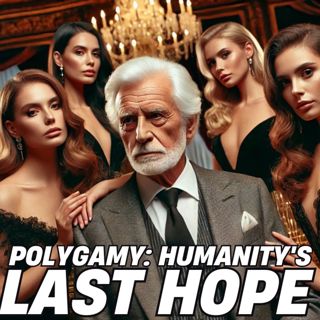
E110: Population Collapse: What It Means for Humanity - w/ Dr. Mads Larsen
In this episode, researcher Mads Larsen warns that modern societies may be on a path to self-eradication unless we find a way to reconcile female freedom with reproduction.Guest Info: Mads Larsen, researcher at the University of Oslo and author of Stories of Love: From Vikings to Tinder (open access)Topics Covered:Global population collapse and generational shrinkageWhy South Korea’s fertility rate (.7) spells demographic disasterHow female mate choice and Tinder skew the dating marketHistorical shifts from arranged marriage to individual choiceNorway’s generous welfare state—and why it hasn’t stopped fertility declineThe illusion of immigration as a solutionThe psychological and economic impacts of declining reproductionPolygamy, incels, and mating inequalityThe promise (and risk) of AI and automation for humanity’s future📺Watch the full episode on YouTube➡️https://youtu.be/LEUX89IARV0 🎙 The Pod is hosted by Jesse Wright💬 For guest suggestions, questions, or media inquiries, reach out at https://elpodcast.media/📬 Never miss an episode – subscribe and follow wherever you get your podcasts.⭐️ If you enjoyed this episode, please rate and review the show. It helps others find us. Thanks for listening!
6 Des 20241h 15min
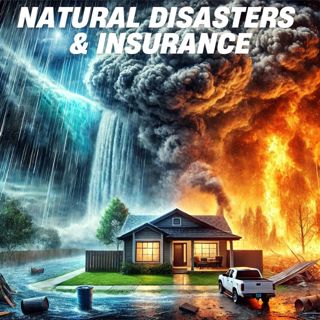
E109: From Hurricanes to Wildfires: The Future of Homeowners Insurance - w/ Martin Grace
Professor Martin Grace explains how natural disasters, inflation, bad policy, and population shifts are breaking the U.S. homeowners insurance market — and what that means for your future coverage.👤 Guest Bio: Dr. Martin F. Grace is a professor of risk management and insurance at the Tippie College of Business at the University of Iowa. A nationally recognized expert on insurance regulation and catastrophe risk, he has published extensively on property insurance, tort reform, and disaster economics. Prior to joining Iowa, he taught at Temple University and Georgia State University.📚 Topics Covered:Why homeowners insurance is getting more expensive and harder to obtainThe effects of hurricanes, wildfires, and convective storms on insurersHow COVID-19 disrupted housing markets, labor, and supply chainsThe failures of public insurance programs in Florida and CaliforniaThe hidden risks of flood zones and outdated FEMA mapsThe role of reinsurance and why global markets matterWhy many condo HOAs are underinsured and at riskThe need for bundled flood and homeowners coveragePolicy fixes that could stabilize the system over the next two decades 📺Watch the full episode on YouTube➡️https://youtu.be/ZGMqJhmue6M 🎙 The Pod is hosted by Jesse Wright💬 For guest suggestions, questions, or media inquiries, reach out at https://elpodcast.media/📬 Never miss an episode – subscribe and follow wherever you get your podcasts.⭐️ If you enjoyed this episode, please rate and review the show. It helps others find us. Thanks for listening!
30 Nov 20241h 6min
